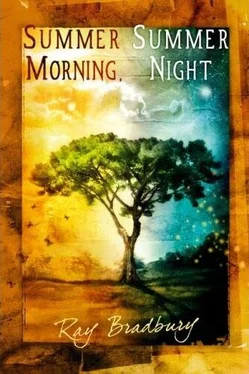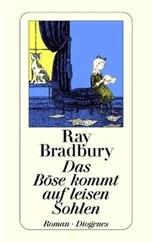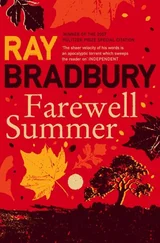AT ELEVEN-THIRTY, there was the old man. He stood in front of the step-less house, as if not knowing what to try next. And then he took a quick step and looked down.
Mr. Widmer, from his upstairs window, whispered, “Yes, yes, go ahead.”
The old man bent over.
“Pick it up!” cried Mr. Widmer.
The old man extended his hands.
“Brush it off! I know, I know it’s dusty. But it’s still fair enough. Brush it off, use it!”
In the moonlight, the old man held a guitar in his hands. It had been lying in the middle of the lawn. There was a period of long waiting during which the old man turned it over with his fingers.
“Go on!” said Mr. Widmer.
There was a tentative chord of music.
“Go on!” said Mr. Widmer. “What voices can’t do, music can. That’s it! Play! You’re right, try it!” urged Mr. Widmer. And he thought: Sing under the windows, sing under the apple trees and near the back porch, sing until the guitar notes shake her, sing until she starts to cry. You get a woman to crying, and you’re on safe ground. Her pride will all wash away; and the best thing to start the dissolving and crying is music. Sing songs, sing “Genevieve, Sweet Genevieve, the years may come, the years may go,” and sing “Meet Me Tonight in Dreamland,” and sing “We were Sailing Along on Moonlight Bay,” and sing “There’s a Long, Long Trail Awinding,” and sing all those old summer songs and old-time songs, any song that’s old and quiet and lovely; do that, and keep on doing that; sing soft and light, with a few notes of the guitar; sing and play and perhaps you’ll hear the key turn in the lock!
He listened.
As pure as drops of water falling in the night, the guitar played, soft, soft, and it was half an hour before the old man began to sing, and it was so faint no one could hear; no one except someone behind a wall in that house, in a bed, or standing in the dark behind a shaded window.
Mr. Widmer went to bed, numb, and lay there for an hour, hearing the faraway guitar.
THE NEXT morning, Mrs. Terle said, “I seen that prowler.”
“Yes?”
“He was there all night. Playing a guitar. Can you imagine? How silly can old people get? Who is he, anyway?”
“I’m sure I don’t know,” said Mr. Widmer,
“Well, him and his guitar went away down the street at six this morning,” said Mrs. Terle.
“Did he? Didn’t he come back?”
“No.”
“Didn’t the door open for him?”
“No. Should it?”
“I suppose not. He’ll be back tonight.”
She went out.
Tonight will do it, thought Mr. Widmer. Tonight, just one more night. He’s not the sort to give up now. Now that he has the guitar, he’ll be back, and tonight will do it. Mr. Widmer whistled, moving about the store.
A truck drove up outside the store, and Mr. Frank Henderson climbed out, a kit of hammers and nails and a saw in his hands. He went around behind the truck and took out a couple of dozen fresh-cut, new pieces of raw, good-smelling lumber.
“Morning, Frank,” called Mr. Widmer. “How’s the carpentry business?”
“Picking up this morning,” said Frank. He sorted out the good, yellow lumber and the bright steel nails. “Got a job.”
“Where?”
“Miss Bidwell’s.”
“Yes?” Mr. Widmer felt his heart begin the familiar pounding.
“Yes. She phoned an hour ago. Wants me to build a new set of steps onto her front porch. Wants it done today.”
Mr. Widmer stood looking at the carpenter’s hands, at the hammer and nails, and the good fresh clean lumber. The sun was rising higher every minute now and the day was bright.
“Here,” said Mr. Widmer, picking up some of the wood. “Let me help.”
They walked across the brick street and over the lawn of Miss Bidwell’s house together, carrying the planks and the saw and the nails.
MR. AND MRS. Welles walked away from the movie theater late at night and went into the quiet little store, a combination restaurant and delicatessen. They settled in a booth, and Mrs. Welles said, “Baked ham on pumpernickel.” Mr. Welles glanced toward the counter and there lay a loaf of pumpernickel.
“Why,” he murmured, “pumpernickel...Druce’s Lake...”
The night, the late hour, the empty restaurant—by now the pattern was familiar. Anything could set him off on a tide of reminiscence. The scent of autumn leaves, or midnight winds blowing, could stir him from himself, and memories would pour around him. Now in the unreal hour after the theater, in this lonely store, he saw a loaf of pumpernickel bread and, as on a thousand other nights, he found himself moved into the past.
“Druce’s Lake,” he said again.
“What?” His wife glanced up.
“Something I’d almost forgotten,” said Mr. Welles. “In 1910, when I was twenty, I nailed a loaf of pumpernickel to the top of my bureau mirror...”
In the hard, shiny crust of the bread, the boys at Druce’s Lake had cut their names: Tom, Nick, Bill, Alec, Paul, Jack. The finest picnic in history! Their faces tanned as they rattled down the dusty roads. Those were the days when roads were really dusty; a fine brown talcum floured up after your car. And the lake was always twice as good to reach as it would be later in life when you arrived immaculate, clean and unrumpled.
“That was the last time the old gang got together.” Mr. Welles said.
After that, college, work and marriage separated you. Suddenly you found yourself with some other group. And you never felt as comfortable or as much at ease again in all your life.
“I wonder,” said Mr. Welles. “I like to think maybe we all knew , somehow, that this picnic might be the last we’d have. You first get that empty feeling the day after high-school graduation. Then, when a little time passes and no one vanished immediately, you relax. But after a year you realize the old world is changing. And you want to do some one last thing before you lose one another. While you’re all still friends, home from college for the summer, this side of marriage, you’ve got to have something like a last ride and a swim in the cool lake.”
Mr. Welles remembered that rare summer morning, he and Tom lying under his father’s Ford, reaching up their hands to adjust this or that, talking about machines and women and the future. While they worked, that day got warm. At last Tom said, “Why don’t we drive out to Druce’s Lake?”
As simple as that.
Yet forty years later, you remember every detail of picking up the other fellows, everyone yelling under the green trees.
“Hey!” Alec beating everyone’s head with the pumpernickel and laughing. “This is for extra sandwiches, later.”
Nick had made the sandwiches that were already in the hamper—the garlic kind they would eat less of as the years passed and the girls moved in.
Then, squeezing three in the front, three in the rear, with their arms across one another’s shoulders, they drove through the boiling, dusty countryside, with a cake of ice in a tin washtub to cool the beer they’d buy.
What was the special quality of that day that it should focus like a stereoscopic image, fresh and clear, forty years later? Perhaps each of them had an experience like his own. A few days before the picnic, he had found a photograph of his father twenty-five years younger, standing with a group of friends at college. The photograph had disturbed him, made him aware as he had not been before of the passing of time, the swift flow of the years away from youth. A picture taken of him as he was now would, in twenty-five years, look as strange to his own children as his father’s picture did to him—unbelievably young, a stranger out of a strange, never-returning time.
Читать дальше
Конец ознакомительного отрывка
Купить книгу










